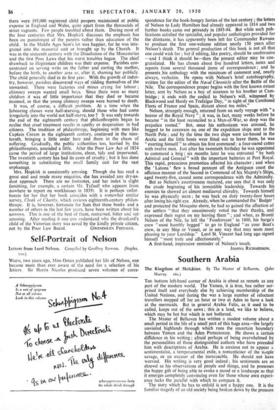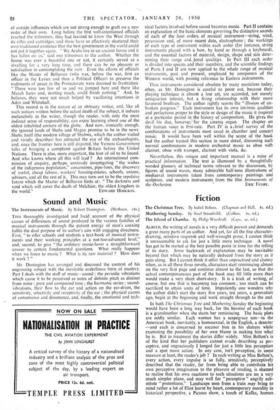Southern Arabia
The Kingdom of Melchior. By The Master of Belhaven. (John Murray. 1 6s. ) THE bottom left-hand corner of Arabia is about as remote as any part of the modern world. The Yemen, it is true, has rather sur- prised itself and everybody else by achieving membership of the United Nations, and during the war a large number of reluctant travellers stopped off for an hour or two at Aden to have a look at the mermaids. But in general Arabia Felix, as it used to be called, keeps out of the news ; this ,is a land, we like to believe, which may be hot but which is not bothered. The Master of Belhaven has written a modest volume about a small period in the life of a small part of this huge area—the largely unvisited highlands through which runs the uncertain boundary between Yemen and the Aden Protectorate. He shows a certain diffidence in his writing ; afraid perhaps of being overwhelmed by the personalities of those distinguished authors who have preceded him with descriptions of Arabia. He is anxious not to appear a sentimentalist, a temperamental exile, a romanticiser of the sitnple savage, or an excuser of the inexcusable. He should .not have worried. His writing is very good indeed ; his sentiments are as shrewd as his observations of people and things, and he possesses the happy gift of being able to evoke a mood or a landscape so that it emerges completely convincing even for those whose own experi- ence lacks the parallel with which to compare it. The story which he has to unfold is not a happy one. It is the familiar tragedy of an old society being broken down by the pressure of outside influences which are not strong enough to graft on a new order of their own. Long before the first well-intentioned officials reached the tribesmen, they had learned to know the West through its rifles and cartridges, and these have so effectively shattered their own traditional existence that the best government in the world could not put it together again. " We Arabs live in an ancient house and it has fallen on us," said one tribesman to the author. Whether the house was ever a beautiful one or not, it certainly served as a dwelling for a very long time, and there can be no pleasure or satisfaction in contemplating the ruin. Even the efforts of officials like the Master of Belhaven (who was, before the war, first an officer in the Levies and then a Political Officer) to preserve the rudiments of peace in the Protectorate were doomed to frustration. " There were too few of us and we jumped here and there like March hares and, starting much, could finish nothing." And, he believes, they were not much helped by vacillating intentions in Aden and Whitehall.
This record is in the nature of an obituary notice, and, like all such notices written before the actual death of the subject, it induces melancholy in the writer, though the reader, with only the most indirect sense of responsibility, can enjoy learning about one of the oldest inhabited corners of the globe. And now, ironically enough, the ignored lands of Sheba and Magan promise to be in the news. Sheba itself (the modern village of Shabwa, which the author visited and vividly describes) has attracted the eye of the archaeologists, and, since the frontier here is still disputed, the Yemeni Government talks of bringing a complaint against Britain before the United Nations. There is also, more important, the hint of oil to be found. And who knows where all this will lead ? An international com- mission of enquiry, perhaps, anxiously investigating " the wishes of the indigenous population," concessions, pipe-lines, the discovery of useful, cheap labour, workers' housing-estates, schools, unions, advisers, and all the rest of it. This may turn out to be the repulsive future which the Master of Belhaven hints at: "The darkness and void which will cover the death of Melchior, the oldest kingdom in



































 Previous page
Previous page